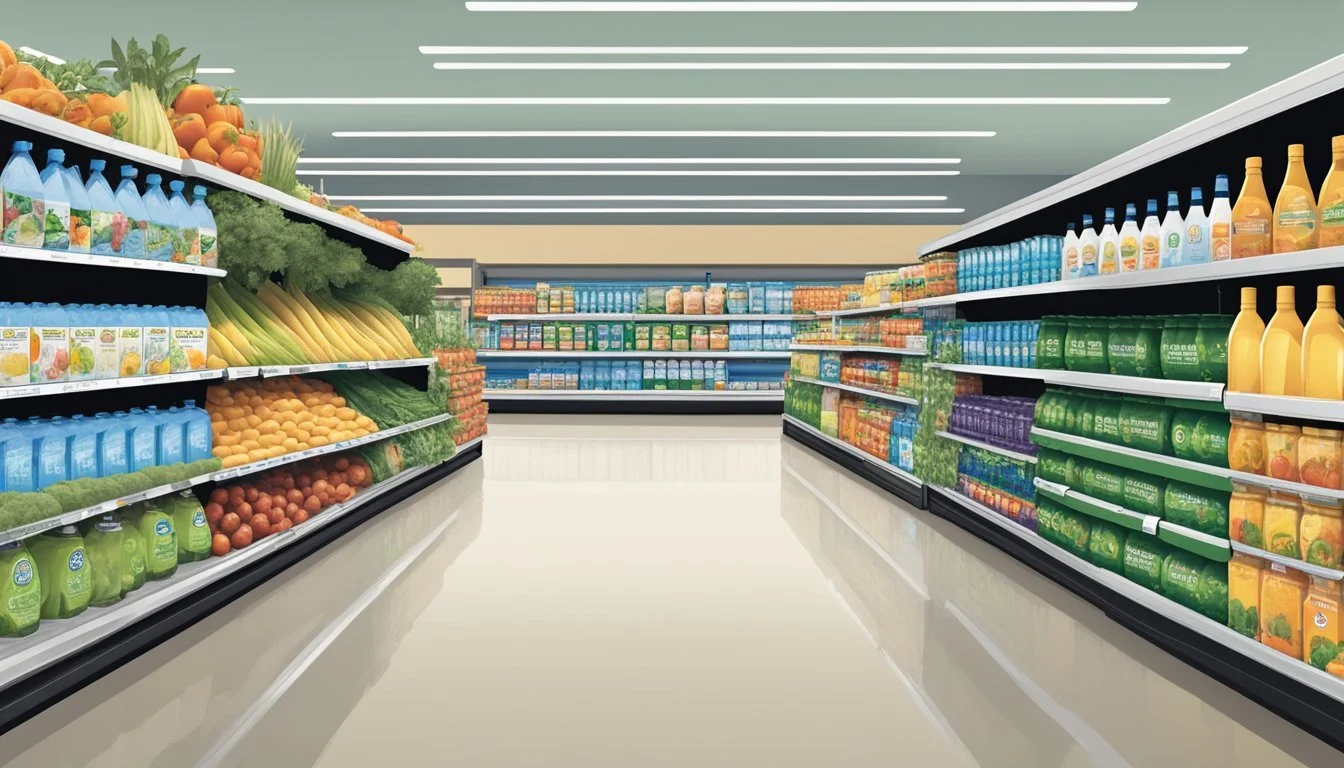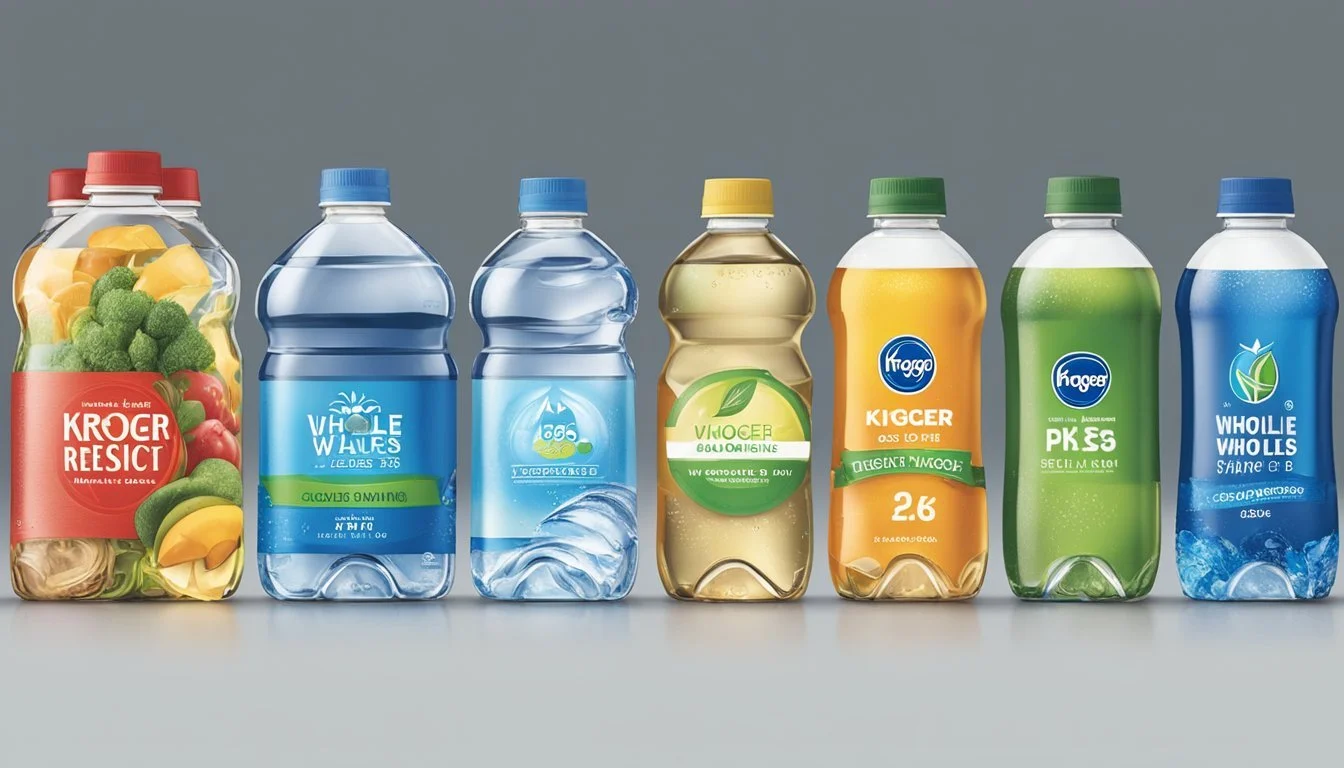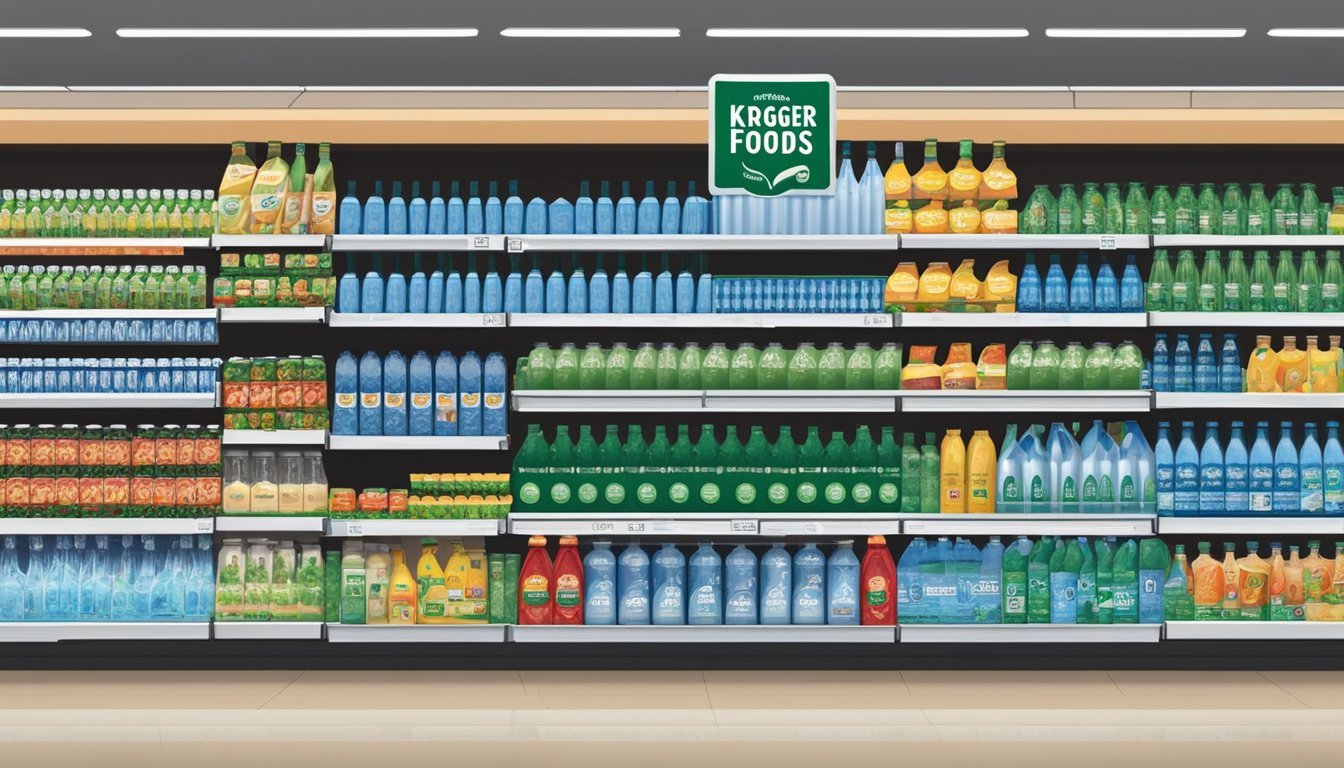Kroger vs. Whole Foods 365
Comparing Bottled Water Quality
Choosing the right bottled water can be more complicated than it seems with numerous brands offering seemingly similar products. Two popular options, Kroger and Whole Foods 365, often appear on shoppers' radar. Whole Foods 365 spring water tastes sour with a dry aftertaste, contrasting with Kroger's adherence to safety and quality standards. Yet, each has its loyal followers drawn to particular taste preferences and brand values.
Kroger bottled water meets FDA regulations, ensuring a level of safety and quality that consumers trust. Despite lingering concerns about contaminants like microplastics and BPA, many are drawn to the affordability and availability of Kroger water. Whole Foods 365, while often more expensive, appeals to those who prioritize taste, albeit one that not everyone finds palatable.
Environmental considerations add another layer to the decision. Both brands face scrutiny over the environmental impact of plastic waste, challenging consumers to weigh convenience against ecological responsibility. By understanding these nuances, shoppers can make more informed choices between Kroger and Whole Foods 365 bottled waters.
Understanding Bottled Water
Bottled water comes in various types with specific sources and treatment methods, each regulated to ensure safety and quality. Additionally, bottled water impacts health differently depending on its contents, and its production affects the environment through waste and pollution concerns.
Types of Bottled Water
Bottled water types include spring water, purified water, and those enhanced with electrolytes and minerals. Spring water flows from an underground formation, collected at the source or via a borehole. Purified water undergoes processes like reverse osmosis or distillation to remove impurities. Sports and fitness enthusiasts often favor water fortified with electrolytes for better hydration and performance.
Regulatory Oversight
Safety and quality of bottled water are regulated by agencies like the FDA and the EPA. The FDA oversees labeling, ensuring clarity about water sources and treatments. The International Bottled Water Association (IBWA) imposes additional standards, emphasizing hygienic practices. Continuous monitoring ensures compliance with set limits for contaminants, aligning with the EPA’s regulations for public drinking water.
Bottled Water and Health
Health aspects of bottled water focus on microplastics, BPA, and PFAS. While many bottled waters are now BPA-free, concerns about microplastics persist due to their potential effects on human health. Studies, including those reported by Consumer Reports, have found PFAS ("forever chemicals") in several brands, raising alarms about long-term exposure risks.
Environmental Impact and Packaging
The environmental impact of bottled water includes issues like plastic waste, pollution, and resource depletion. Though some brands use recyclable or biodegradable materials, plastic bottles predominantly contribute to pollution. The production and transportation also involve significant resource consumption. Efforts to mitigate this include promoting reusable bottles and enhancing recycling programs.
Brand Overview
Kroger and Whole Foods 365 offer bottled water that caters to different consumer needs. Factors like source, quality, and health considerations play essential roles in differentiating these brands.
Kroger's Water Selection
Kroger provides various bottled water options, including spring water, purified water, and flavored water. The spring water is known for being affordable, typically priced at $1.29 per gallon. Kroger ensures that their bottled water meets FDA regulations, maintaining safety and quality standards.
Consumers are concerned about potential contaminants such as microplastics and BPA. Many Kroger bottles are now BPA-free, addressing this issue. Kroger's bottled water is a practical choice for budget-conscious shoppers seeking reliable hydration.
Whole Foods 365 Water
Whole Foods 365 springs from a commitment to quality and environmental consciousness. The 365 Everyday Value brand offers spring water that is widely considered high-quality and pure. Sourced responsibly, the water is often a popular choice for those concerned with sustainable practices.
PFAS levels, an important health concern, are monitored closely. Their spring water is bottled by Spring Hill, adhering to stringent health and safety standards. Shoppers opting for Whole Foods 365 can expect competitively priced, high-quality water that supports a more eco-friendly footprint.
Water Quality Analysis
Kroger and Whole Foods 365 bottled water are evaluated on various quality metrics. Both brands are scrutinized for harmful substances and filtration effectiveness, as well as overall taste.
Testing and Quality Reports
Consumer Reports and other entities test these waters for contaminants and quality. Kroger's bottled water adheres to FDA regulations and meets safety standards. Concerns about microplastics and BPA persist, though many bottles are now BPA-free.
Whole Foods 365 Spring Water has been tested by Consumer Reports, revealing the presence of PFAS chemicals in some samples. These substances, linked to health issues, underscore the need for thorough testing.
Path to Purity: Filtration and Treatment
Filtration and treatment processes are vital for ensuring water quality. Kroger uses multiple filtration stages, including reverse osmosis and UV light treatment, to eliminate heavy metals, chemicals, and biological contaminants.
Whole Foods 365 emphasizes its spring water origin but also subjects it to rigorous filtration. Despite this, issues like PFAS presence highlight potential gaps. Spring water often contains naturally occurring minerals but may also carry trace arsenic or lead, making effective filtration crucial.
Comparative Taste Test
Taste is a significant factor for consumers choosing bottled water. Kroger water has a neutral flavor profile, attributed to its intensive purification process that removes most dissolved solids. This results in a clean, if somewhat flat, taste.
On the other hand, Whole Foods 365 Spring Water is noted for its mineral content, giving it a distinct, slightly mineral taste. Consumer reviews are mixed, with some appreciating the flavor, while others find it less palatable due to a perceived dry aftertaste.
Both waters cater to different preferences, with Kroger appealing to those favoring pure, tasteless water and Whole Foods 365 targeting those who enjoy mineral-rich spring water.
Consumer Experience
Consumers consider various factors when choosing between Kroger and Whole Foods 365 bottled water, including hydration benefits and the clarity of labels and marketing. Both companies provide different attributes that influence the consumer experience.
Hydration Benefits
Hydration is a primary concern for anyone purchasing bottled water. Kroger and Whole Foods 365 both aim to provide clean, refreshing water that helps meet daily hydration needs.
Kroger's bottled water adheres to FDA regulations, ensuring a reliable quality standard. Whole Foods 365 often markets its water as being sourced from springs or purified using advanced filtration methods.
Consumers often note that the taste and mineral content play significant roles in their preference. Kroger water is reputed for its consistency and neutral taste. Whole Foods 365, on the other hand, often includes minerals for taste that some consumers find more refreshing.
Understanding Labels and Marketing
Kroger and Whole Foods 365 differ significantly in their labeling and marketing strategies. Kroger focuses on simplicity, with labels that highlight safety, the absence of contaminants, and FDA approval.
Whole Foods 365 places emphasis on the source of the water and any additional purification processes. Their marketing often highlights organic and natural aspects.
It's essential for consumers to identify terms like "purified," "spring water," or "distilled" to understand what they are buying. Both companies aim to make their labeling clear, but the emphasis differs, influencing consumer trust and preference.
Corporate Responsibility
Kroger and Whole Foods 365 have distinct approaches to corporate responsibility, particularly in their environmental initiatives. These initiatives address the impact of their bottled water on sustainability and pollution.
Environmental Initiatives
Whole Foods 365 emphasizes its commitment to sustainably sourced water. It aims to limit plastic waste by promoting recycling programs and using bottles made from recycled materials. Whole Foods also assesses the environmental footprint of their water sources to ensure long-term sustainability.
Kroger has taken steps to reduce the environmental impact of its bottled water. The company focuses on adhering to FDA regulations, which includes monitoring for contaminants such as microplastics and BPA. Kroger also invests in environmental programs that address plastic pollution and aim to reduce overall waste from their bottled water products.
Purchasing Guide
Selecting the best bottled water involves considering factors like price and water quality. Here are some guidelines to inform your choice between Kroger and Whole Foods 365 bottled water.
Choosing the Right Water for You
When deciding between Kroger and Whole Foods 365 bottled water, consider the source and type of water. Kroger typically offers purified and spring water options. Whole Foods 365 often emphasizes spring water, which may appeal to those seeking natural sources.
Check for certifications and test results. Kroger adheres to FDA regulations, ensuring safety and quality. Whole Foods 365 also meets stringent standards but has faced recalls due to contaminants like arsenic. Reviewing these details helps you make an informed choice.
Additionally, think about packaging. Many of Kroger's bottles are now BPA-free, addressing health concerns related to plastics. Whole Foods also offers BPA-free options but tends to focus more on recyclable materials, aligning with environmental sustainability goals.
Assessing Cost vs. Quality
Price is a crucial factor. Kroger bottled water is often more budget-friendly, making it a practical choice for daily consumption without breaking the bank. Prices at Whole Foods 365 can be higher, reflecting their emphasis on premium sourcing and sustainable practices.
Evaluate the trade-off between cost and quality. Kroger's affordability does not compromise on safety but might lack the premium taste and purity some consumers prefer. Conversely, Whole Foods 365 offers potentially higher quality with a focus on natural ingredients but at a higher cost.
Consider whether the additional expense at Whole Foods translates to a noticeable difference in taste or health benefits for you. Sometimes the extra cost can be justified by a superior product, but it's important to weigh this against your budget and needs.
Final Recommendations
When deciding between Kroger and Whole Foods 365 bottled water, several factors come into play.
Quality and Safety: Kroger bottled water meets FDA regulations, ensuring it adheres to safety and quality standards. Whole Foods 365 also provides a safe option, though both brands have concerns over potential contaminants like microplastics and BPA.
Taste: Taste varies and is subjective. Whole Foods 365 spring water may taste slightly sour with a dry aftertaste, while opinions on Kroger’s taste are mixed but generally neutral.
Price: Price is a significant consideration. Whole Foods 365 typically offers its spring water at an affordable rate, often around 69 cents per bottle. Kroger's pricing may vary by location, but is generally competitive.
Environmentally Friendly: Both brands face challenges with environmental impact. Plastic waste is a significant issue, taking hundreds of years to biodegrade. Both companies offer some BPA-free options, but consumers are encouraged to recycle.
Category Kroger Whole Foods 365 Quality and Safety FDA compliant Safe, some concerns Taste Neutral Sour, dry aftertaste Price Competitive Approximately 69 cents Environmental Some BPA-free options Some BPA-free options
Bottom Line: Choosing between Kroger and Whole Foods 365 involves balancing taste preferences, budget, and environmental considerations. Both offer safe, quality options with their unique pros and cons.
More About Kroger
Kroger vs Kirkland Signature: Which Bottled Water is Better?
Kroger vs Richard's Rainwater: Which Bottled Water is Better?
Mountain Valley Spring Water vs Kroger: Which Bottled Water is Better?
Whole Foods Italian Still Mineral water vs Kroger: Which Bottled Water is Better?
More About Whole Foods 365
Acqua Pana vs Whole Foods 365: Which Bottled Water is Better?
Alkaline88 vs Whole Foods 365: Which Bottled Water is Better?
Antipodes vs Whole Foods 365: Which Bottled Water is Better?
Aqua Carpatica vs Whole Foods 365: Which Bottled Water is Better?
Arrowhead vs Whole Foods 365: Which Bottled Water is Better?
Big Chill vs Whole Foods 365: Which Bottled Water is Better?
Boxed Water vs Whole Foods 365: Which Bottled Water is Better?
Cascade Mountain vs Whole Foods 365: Which Bottled Water is Better?
Castle Rock vs Whole Foods 365: Which Bottled Water is Better?
Core Hydration vs Whole Foods 365: Which Bottled Water is Better?
Crystal Geyser vs Whole Foods 365: Which Bottled Water is Better?
Deer Park vs Whole Foods 365: Which Bottled Water is Better?
Hawaii Volcanic vs Whole Foods 365: Which Bottled Water is Better?
Hawaiian Springs vs Whole Foods 365: Which Bottled Water is Better?
Ice Mountain vs Whole Foods 365: Which Bottled Water is Better?
Icelandic Glacial vs Whole Foods 365: Which Bottled Water is Better?
Just Water vs Whole Foods 365: Which Bottled Water is Better?
Liquid Death vs Whole Foods 365: Which Bottled Water is Better?
Mountain Valley Spring Water vs Whole Foods 365: Which Bottled Water is Better?
Nestle Pure Life vs Whole Foods 365: Which Bottled Water is Better?
Open Water vs Whole Foods 365: Which Bottled Water is Better?
Poland Spring vs Whole Foods 365: Which Bottled Water is Better?
Pure Life vs Whole Foods 365: Which Bottled Water is Better?
Purely Sedona vs Whole Foods 365: Which Bottled Water is Better?
Richard's Rainwater vs Whole Foods 365: Which Bottled Water is Better?
San Pellegrino vs Whole Foods 365: Which Bottled Water is Better?
Simple Truth vs Whole Foods 365: Which Bottled Water is Better?
Smartwater vs Whole Foods 365: Which Bottled Water is Better?
Solan de Cabras vs Whole Foods 365: Which Bottled Water is Better?
Talking Rain AQA vs Whole Foods 365: Which Bottled Water is Better?
Topo Chico vs Whole Foods 365: Which Bottled Water is Better?
Weird Water vs Whole Foods 365: Which Bottled Water is Better?
Whole Foods 365 vs 1907water: Which Bottled Water is Better?
Whole Foods 365 vs BodyArmor: Which Bottled Water is Better?
Whole Foods 365 vs CBD Living: Which Bottled Water is Better?
Whole Foods 365 vs Crystal Lake: Which Bottled Water is Better?
Whole Foods 365 vs Essence pH10: Which Bottled Water is Better?
Whole Foods 365 vs Kirkland Signature: Which Bottled Water is Better?
Whole Foods 365 vs Proud Source: Which Bottled Water is Better?
Whole Foods Italian Still Mineral water vs Whole Foods 365: Which Bottled Water is Better?
Zephyrhills vs Whole Foods 365: Which Bottled Water is Better?






